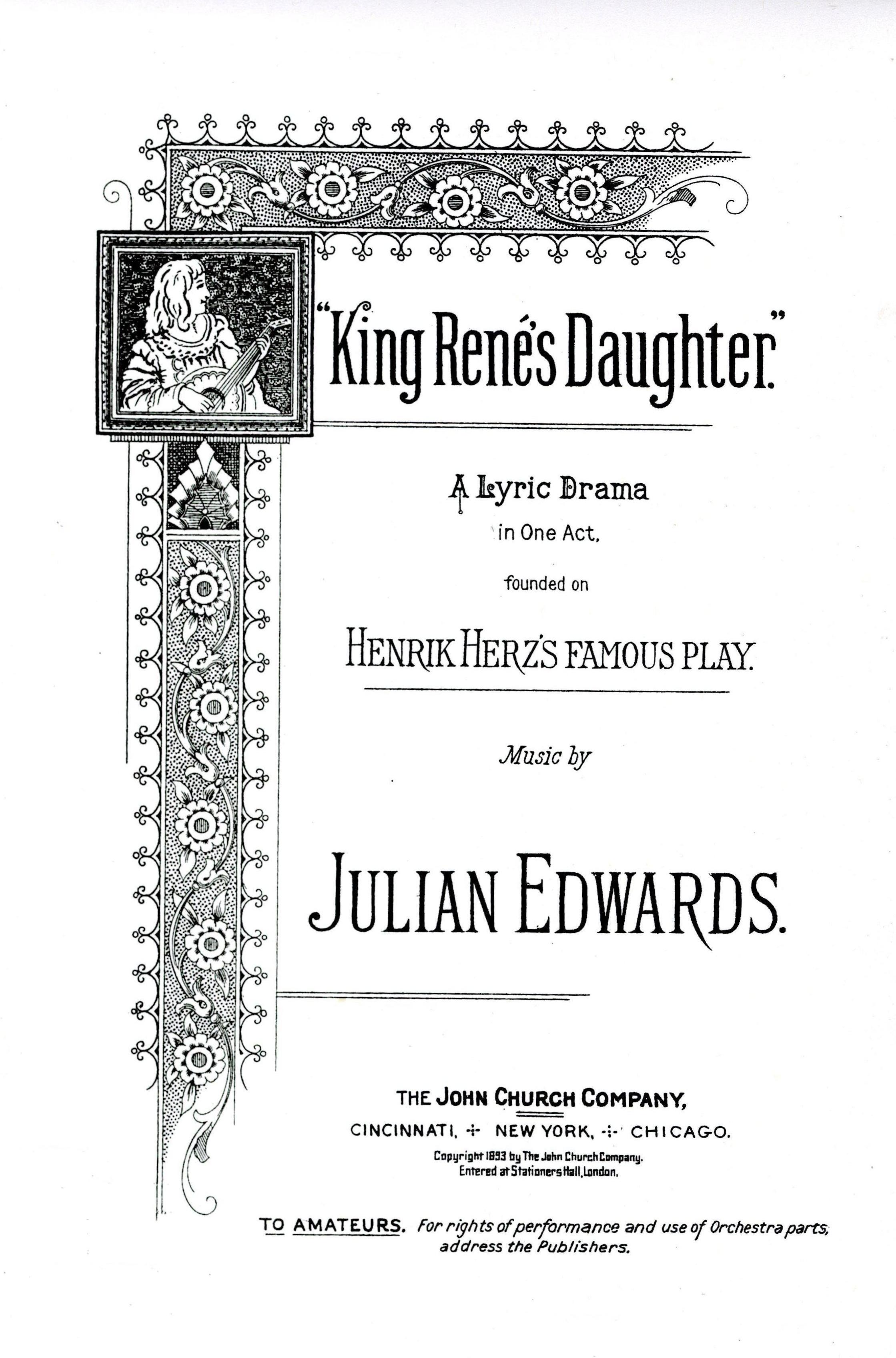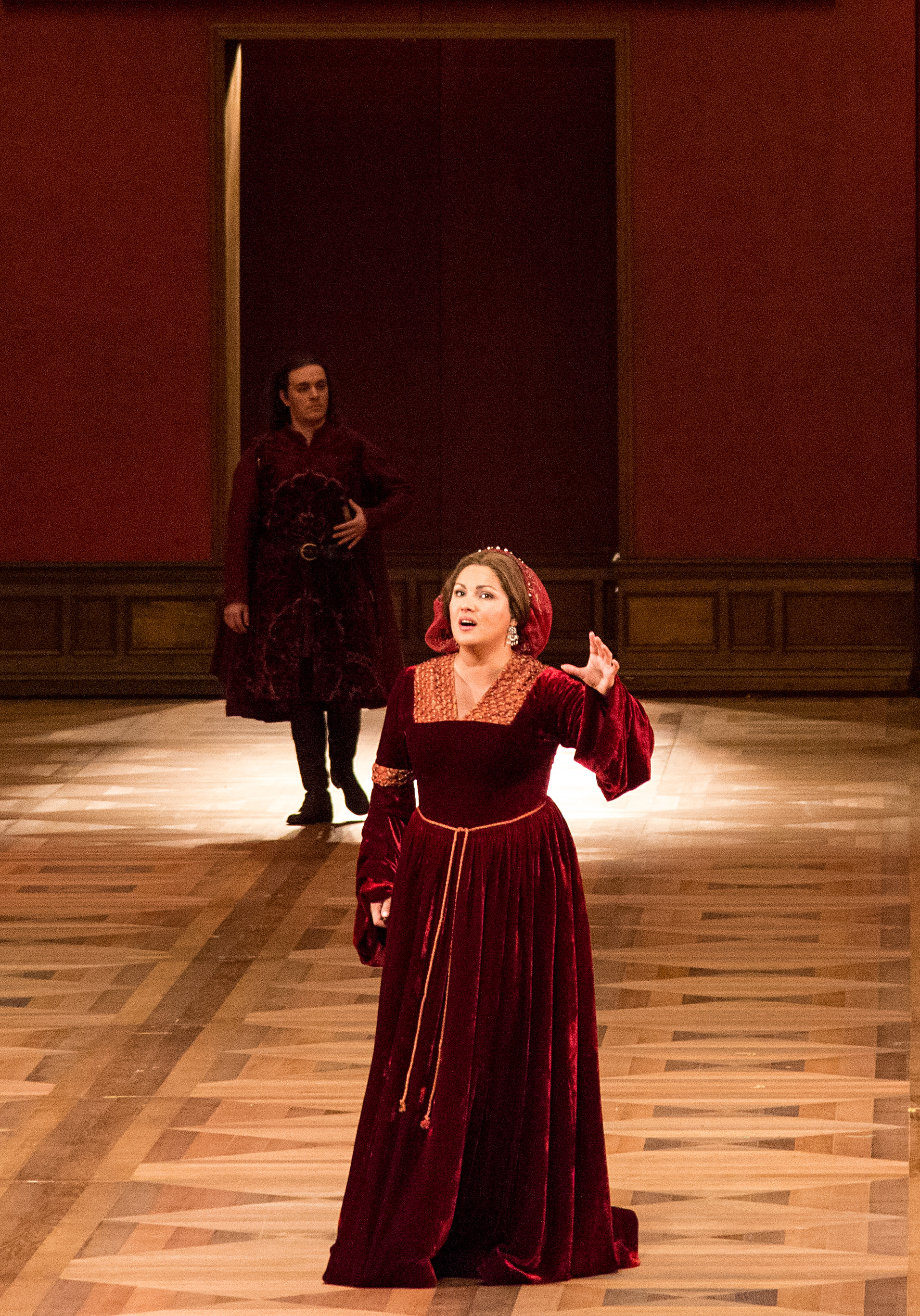|
Iolanta
''Iolanta'', Op. 69, (russian: Иоланта, links=no ) is a lyric opera in one act by Pyotr Tchaikovsky. It was the last opera he composed. The libretto was written by the composer's brother Modest Tchaikovsky, and is based on the Danish play ' (''King René's Daughter'') by Henrik Hertz, a romanticised account of the life of Yolande de Bar. In the original Danish play, the spelling of the princess's name was "Iolanthe", later adopted for the otherwise unrelated Gilbert and Sullivan operetta of that name. The play was translated by Fyodor Miller and adapted by Vladimir Zotov. The opera received its premiere on 18 December 1892 in Saint Petersburg. Composition history Composing upon the completion of '' The Queen of Spades'', Tchaikovsky worried that he had lost his creative inspiration after such a large project. He started ''Iolanta'' in June 1891 with the central duet, and, despite his worries, finished composition in September and orchestration in November. The public ... [...More Info...] [...Related Items...] OR: [Wikipedia] [Google] [Baidu] |
King René's Daughter
''Kong Renés Datter'' (''King René’s Daughter'') is a Danish verse drama written in 1845 by Henrik Hertz. It is a fictional account of the early life of Yolande of Lorraine, daughter of René of Anjou, in which she is depicted as a beautiful blind sixteen-year-old princess who lives in a protected garden paradise. The play was highly popular in the 19th century. It was translated into many languages, copied, parodied and adapted. The Russian adaptation by Vladimir Zotov was used as the basis for the 1892 opera ''Iolanta'', written by Tchaikovsky, with libretto by his brother Modest Ilyich Tchaikovsky. The name of the central character is given as "Iolanthe" in the original and in early English versions. Characters *King René of Naples, Count of Provence *Iolanthe, his daughter *Tristan, Count of Vaudémont *Sir Geoffrey of Orange, Tristan's friend *Sir Almerick, a knight in René's court *Ebn Jahia, a Moorish physician *Bertrand, guardian of Iolanthe's garden *Martha, his wi ... [...More Info...] [...Related Items...] OR: [Wikipedia] [Google] [Baidu] |
Yolande De Bar
Yolande (2 November 1428, Nancy – 23 March 1483, Nancy) was Duchess of Lorraine (1473) and Bar (1480). She was the daughter of Isabella, Duchess of Lorraine, and René of Anjou (King of Naples, Duke of Anjou, Bar and Lorraine, Count of Provence). Though she was nominally in control of major territories, she ceded her power and titles to her husband and her son. In addition, her younger sister was Margaret of Anjou, Queen of England. In the 19th century, a romanticised version of her early life was popularised by the play ''King René's Daughter'' by Henrik Hertz, in which she is portrayed as a beautiful blind princess living in an isolated garden paradise. It was later adapted to Tchaikovsky's opera ''Iolanta''. There is no evidence that she was ever blind. Marriage and children In 1445, she married her second cousin Frederick II, Count of Vaudémont (1420–1470), at Nancy. The marriage was a dynastic alliance, arranged to end the dispute which existed between René of Anj ... [...More Info...] [...Related Items...] OR: [Wikipedia] [Google] [Baidu] |
Modest Ilyich Tchaikovsky
Modest Ilyich Tchaikovsky (russian: Моде́ст Ильи́ч Чайко́вский; –) was a Russian dramatist, opera librettist and translator. Early life Modest Ilyich was born in Alapayevsk, Verkhotursky Uyezd, Perm Governorate, the younger brother of the composer Pyotr Ilyich Tchaikovsky. He graduated from the Imperial School of Jurisprudence with a degree in law. In 1876, Modest became the tutor to a deaf-mute boy Nikolai ("Kolya") Hermanovich Konradi (1868–1922) and, using a special teaching method, helped him to talk, write, and read. In his still unpublished Autobiography, broadly quoted by Alexander Poznansky, Modest Ilyich Tchaikovsky mentions his and his brother Pyotr Ilyich Tchaikovsky's homosexuality.Poznansky, Alexander. ''Tchaikovsky Through Others' Eyes''. Indiana University Press, 1999, p. 8 Career Modest chose to dedicate his entire life to literature and music. He wrote plays, translated sonnets by Shakespeare into Russian and wrote librettos for op ... [...More Info...] [...Related Items...] OR: [Wikipedia] [Google] [Baidu] |
Anna Netrebko
Anna Yuryevna Netrebko (russian: Анна Юрьевна Нетребко; born 18 September 1971) is an Austrian operatic soprano with an active international career and performed prominently at the Salzburg Festival, Metropolitan Opera, Vienna State Opera, and The Royal Opera. Discovered and promoted by Valery Gergiev, she began her career at the Mariinsky Theatre, collaborating with the conductor in the theater and performances elsewhere. She was noticed globally after playing Donna Anna in Mozart's ''Don Giovanni'' at the 2002 Salzburg Festival. She had been known for her rendition of lyric and coloratura soprano roles but proceeded into heavier 19th-century romantic roles, such as Leonora in ''Il trovatore'' and the role of Lady Macbeth in ''Macbeth''. Since 2016, she has turned her focus to verismo repertoire. In 2015 she married Azerbaijani tenor Yusif Eyvazov, with whom she has been performing frequently since. She has been an exclusive artist for Deutsche Grammophon si ... [...More Info...] [...Related Items...] OR: [Wikipedia] [Google] [Baidu] |
Henrik Hertz
Henrik Hertz (25 August 1797 – 25 February 1870) was a Danish poet. Biography He was born of Jewish parents in Copenhagen. In 1817 he was sent to the university. His father died in his infancy, and the family property was destroyed in the bombardment of 1807. The boy was brought up by his relative , a well-known newspaper editor. Young Hertz passed his examination in law in 1825. He lived in the South of France. But his taste was all for literature, and in 1826-1827 two plays of his were produced, ''Hr. Burchardt og hans Familie'' (''Mr. Burchardt and his Family'') and ''Kjærlighed og Politi'' (''Love and Policy''); in 1828 followed the comedy of ''Flyttedagen'' (''Moving Day''). In 1830 he brought out what was a complete novelty in Danish literature, a comedy in rhymed verse, '' Amors Genistreger'' (''Cupid's Strokes of Genius''). In the same year Hertz published anonymously ''Gjengangerbrevene'' (''Letters from a Ghost''), which he pretended were written by Jens Immanue ... [...More Info...] [...Related Items...] OR: [Wikipedia] [Google] [Baidu] |
Mariinsky Theatre
The Mariinsky Theatre ( rus, Мариинский театр, Mariinskiy teatr, also transcribed as Maryinsky or Mariyinsky) is a historic theatre of opera and ballet in Saint Petersburg, Russia. Opened in 1860, it became the preeminent music theatre of late 19th-century Russia, where many of the stage masterpieces of Tchaikovsky, Mussorgsky, and Rimsky-Korsakov received their premieres. Through most of the Soviet era, it was known as the Kirov Theatre. Today, the Mariinsky Theatre is home to the Mariinsky Ballet, Mariinsky Opera and Mariinsky Orchestra. Since Yuri Temirkanov's retirement in 1988, the conductor Valery Gergiev has served as the theatre's general director. Name The theatre is named after Empress Maria Alexandrovna, wife of Tsar Alexander II. There is a bust of the Empress in the main entrance foyer. The theatre's name has changed throughout its history, reflecting the political climate of the time: * 1860 – 1920: Imperial Mariinsky Theatre ( rus, Импера ... [...More Info...] [...Related Items...] OR: [Wikipedia] [Google] [Baidu] |
The Nutcracker
''The Nutcracker'' ( rus, Щелкунчик, Shchelkunchik, links=no ) is an 1892 two-act ballet (""; russian: балет-феерия, link=no, ), originally choreographed by Marius Petipa and Lev Ivanov with a score by Pyotr Ilyich Tchaikovsky (Op. 71). The libretto is adapted from E. T. A. Hoffmann's 1816 short story "The Nutcracker and the Mouse King". Although the original production was not a success, the 20-minute suite that Tchaikovsky extracted from the ballet was. The complete ''Nutcracker'' has enjoyed enormous popularity since the late 1960s and is now performed by countless ballet companies, primarily during the Christmas season, especially in North America. Major American ballet companies generate around 40% of their annual ticket revenues from performances of ''The Nutcracker''. The ballet's score has been used in several film adaptations of Hoffmann's story. Tchaikovsky's score has become one of his most famous compositions. Among other things, the score is ... [...More Info...] [...Related Items...] OR: [Wikipedia] [Google] [Baidu] |
Pyotr Ilyich Tchaikovsky
Pyotr Ilyich Tchaikovsky , group=n ( ; 7 May 1840 – 6 November 1893) was a Russian composer of the Romantic period. He was the first Russian composer whose music would make a lasting impression internationally. He wrote some of the most popular concert and theatrical music in the current classical repertoire, including the ballets '' Swan Lake'' and ''The Nutcracker'', the ''1812 Overture'', his First Piano Concerto, Violin Concerto, the ''Romeo and Juliet'' Overture-Fantasy, several symphonies, and the opera ''Eugene Onegin''. Although musically precocious, Tchaikovsky was educated for a career as a civil servant as there was little opportunity for a musical career in Russia at the time and no system of public music education. When an opportunity for such an education arose, he entered the nascent Saint Petersburg Conservatory, from which he graduated in 1865. The formal Western-oriented teaching that he received there set him apart from composers of the contemporary nati ... [...More Info...] [...Related Items...] OR: [Wikipedia] [Google] [Baidu] |
Eduard Nápravník
Eduard Francevič Nápravník (Russian: Эдуа́рд Фра́нцевич Напра́вник; 24 August 1839 – 10 November 1916) was a Czech conductor and composer. Nápravník settled in Russia and is best known for his leading role in Russian musical life as the principal conductor of the Imperial Mariinsky Theatre in Saint Petersburg for many decades. In that capacity, he conducted the premieres of many operas by Russian composers, including those by Mussorgsky, Tchaikovsky and Rimsky-Korsakov. Biography Nápravník was born in Býšť, Bohemia, in 1839. His studies of music were precariously uneven as a child, being the son of a poor teacher. Orphaned in 1853 at the age of 14, he first worked as a local church organist. In 1854 he entered the Prague Organ School, where he studied under Jan Bedřich Kittl and others, eventually becoming an assistant teacher as Kittl's generosity allowed him to continue his studies. In 1861, he worked in Russia for the first time as con ... [...More Info...] [...Related Items...] OR: [Wikipedia] [Google] [Baidu] |
Bolshoi Theatre
The Bolshoi Theatre ( rus, Большо́й теа́тр, r=Bol'shoy teatr, literally "Big Theater", p=bɐlʲˈʂoj tʲɪˈatər) is a historic theatre in Moscow, Russia, originally designed by architect Joseph Bové, which holds ballet and opera performances. Before the October Revolution it was a part of the Imperial Theatres of the Russian Empire along with Maly Theatre (Moscow), Maly Theatre (''Small Theatre'') in Moscow and a few theatres in Saint Petersburg (Hermitage Theatre, Bolshoi Theatre, Saint Petersburg, Bolshoi (Kamenny) Theatre, later Mariinsky Theatre and others). The Bolshoi Ballet and Bolshoi Opera are among the oldest and best known ballet and opera companies in the world. It is by far the world's biggest ballet company, with more than 200 dancers. The theatre is the parent company of The Bolshoi Ballet Academy, a leading school of ballet. It has a branch at the Bolshoi Theater School in Joinville, Brazil. The main building of the theatre, rebuilt and renovat ... [...More Info...] [...Related Items...] OR: [Wikipedia] [Google] [Baidu] |
Gustav Mahler
Gustav Mahler (; 7 July 1860 – 18 May 1911) was an Austro-Bohemian Romantic composer, and one of the leading conductors of his generation. As a composer he acted as a bridge between the 19th-century Austro-German tradition and the modernism of the early 20th century. While in his lifetime his status as a conductor was established beyond question, his own music gained wide popularity only after periods of relative neglect, which included a ban on its performance in much of Europe during the Nazi era. After 1945 his compositions were rediscovered by a new generation of listeners; Mahler then became one of the most frequently performed and recorded of all composers, a position he has sustained into the 21st century. Born in Bohemia (then part of the Austrian Empire) to Jewish parents of humble origins, the German-speaking Mahler displayed his musical gifts at an early age. After graduating from the Vienna Conservatory in 1878, he held a succession of conducting posts of rising ... [...More Info...] [...Related Items...] OR: [Wikipedia] [Google] [Baidu] |



.jpg)

